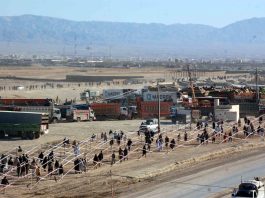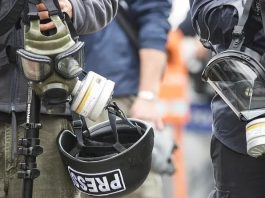Bannu: With the coldest time of the year here, bringing rain and causing the mercury to fall to a freezing point, the internally displaced people (IDPs) in the Bannu city have been complaining of health conditions caused by exposure to cold.
Bannu city and the villages in the suburbs host most of the nearly 1 million people displaced from the neighboring North Waziristan Agency after the Pakistan Army started an operation against militants in the agency in June last year.
There are about 22,000 families residing in tents at the Bakka Khel Camp in the frontier region of Bannu, a vast, open stretch of scrubland where IDPs are exposed to ailments. .
Around other 500 families live at various places in Bannu in tents provided by the Al-Khidmat Foundation, the humanitarian wing of Jamaat Islami (JI), a religious party.
“We have set up tents on the roof top of our house for further space where we are exposed to cold winter air,” said Waqar Ahmad,18, who lives in Bannu Township in a house of two rooms for the last seven months.
Since most of the IDPs from North Waziristan follow the tribal system of living together as joint-families, there are some with as many as 35 members living in a house with two rooms. This has caused problems related to cold and hygienic issue because some of them have to live on open roof-tops under tents.
“I live with my brother because we cannot afford another house nor can we live in tent-houses as we have small kids in our family and they would not be able to survive this spell of cold weather,” said Waqar. He said he had been taking the kids almost daily to the hospital for treatment of cold related diseases.
“We have never ever seen such extreme cold weather in Waziristan,” said Khalid Masih, a member of the minority Christian community, living in a camp set up by the Al-Khidmat Foundation. “My children and I stay awaken in the night as the chill creeps into our tent.”
A displaced woman in the minority camp said she badly missed her home in North Waziristan where she would light a fire in the winter and the family would sit around it for hours.
“Here we are not allowed to light fire as the tent may catch fire, damaging the whole camp and threatening the safety of inhabitants,” she said, requesting anonymity as she did not want media to name her.
As the cold further damages the health of the already malnourished and unprotected displaced people, mainly children, poverty keeps them from accessing medical facilities.
Medical experts are of the opinion that stress, crowded conditions, malnutrition, exposure and lack of medical attention are causing the mortality ratio among the displaced people to spiral. However, it is the extreme weather conditions that are claiming the lives of the elderly and the children.
“The disease and death ratio among the IDPs has registered a rise and even healthy middle aged people are dying of common health conditions because they cannot access timely treatment,” said Daraz Khan Dawar, a local doctor
He said that stress and extreme cold have increased diseases like hypertension and heart problems amongst IDPs that can cause sudden death.
Dr.Gul Anar Jan Wazir, a physician based in Bannu, told News Lens that cold weather, lack of medication and communicable diseases due to unhygienic conditions are the main reasons for the rise in the mortality graph among IDPs.
Several members of the displaced minority community of North Waziristan Agency told News Lens that they neither receive food items at the ration points nor cash aid as other IDPs do. This is due to their dual addresses – in NWA and villages in Punjab. They said they lived in NWA and had been displaced from there, not Punjab.
“We are sons of this soil and have served it for many years but we are not recognized as IDPs”, said Khalid Masih.
Rehmaullah, a coordinator for Al Khidmat Foundation, said they had been providing ambulance services for IDPS that die in Bannu or elsewhere.
“We arrange documentation and transportation for the dead bodies to NWA as most of the people want to bury their dead in their ancestral graveyards or at least in the soil of NWA,” he said.
IDPs residing in Bannu told New Lens they wanted to go home back as soon as they can.
“I don’t need any cash, any ration, any non-food items; just please send us back to our homes,” said Noor Hassan, an IDP from Mirali in NWA.




